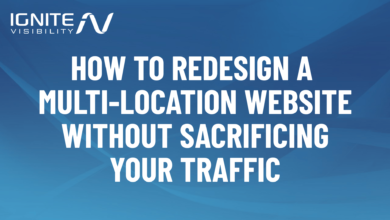2025 AI Search Shifts: Master Local SEO Now

▼ Summary
– AI-driven search experiences like Google’s AI Overviews are disrupting traditional keyword-based SERPs by synthesizing answers and reducing click-throughs to source pages.
– Marketers need a bifurcated strategy: create informational content for AI Overviews and optimize local profiles for Maps Pack visibility, as these features rarely appear together.
– Alternative platforms like Perplexity, Reddit, and TikTok are becoming primary search tools for younger generations, requiring brands to build a distributed content footprint across channels.
– Agentic search is emerging where users delegate tasks to AI, shifting interactions to asynchronous bot-to-bot transactions and increasing operational pressures like price transparency.
– While search is evolving, foundational principles like EEAT criteria, local optimization, and trustworthy content remain crucial for visibility across both AI and traditional search systems.
The digital search landscape is undergoing a profound transformation, driven by the rapid integration of artificial intelligence into everyday user experiences. AI-driven search tools are reshaping how consumers discover brands and make purchasing decisions, moving beyond traditional keyword-based results to anticipate needs, summarize information, and even take action on behalf of users. For businesses with multiple locations, adapting to this new reality is no longer optional, it’s essential for maintaining visibility and relevance.
Google’s introduction of AI Overviews represents a fundamental shift in search engine results pages. These AI-generated summaries now frequently occupy the top portion of the screen, pushing conventional blue links further down the page. Unlike older layouts that presented a list of sources, these overviews synthesize information from across the web, often reducing the need for users to click through to individual websites. For local queries, factors like proximity, reputation, content sentiment, and cited sources play a critical role in determining what information appears in these summaries. Relying solely on structured data or map pack signals is no longer sufficient to capture visibility in this new environment.
A clear divergence has emerged between the types of queries that trigger AI Overviews and those that surface traditional Maps Packs. Informational queries, especially those beginning with words like “how,” “why,” or “what”, are far more likely to generate an AI Overview. In contrast, transactional searches containing phrases like “near me” almost exclusively trigger Maps Pack results. This split demands a dual strategy from marketers. To capture AI Overview visibility, brands should invest in high-quality, educational content that addresses common customer questions, structured in a clear question-and-answer format aligned with E-E-A-T principles. For Maps Pack prominence, optimizing Google Business Profiles, gathering and responding to reviews, and building localized landing pages with schema markup remain vital.
Beyond Google, alternative platforms are gaining significant traction, particularly among younger audiences. Perplexity AI, for example, has grown into a major player with its ability to geolocate users and deliver locally relevant results, often enhanced through integrations with platforms like Yelp and OpenTable. Meanwhile, Reddit has become a trusted resource for authentic recommendations, with a highly engaged user base that values community-driven insights. Local subreddits offer a unique opportunity for brands to build genuine connections with nearby customers. TikTok, too, has evolved into a search tool, with its “Nearby” feed and experimental review features supporting local discovery through visual and social cues.
Generational differences in search behavior are increasingly pronounced. Younger users often turn to platforms like TikTok and Reddit for inspiration, while older demographics still lean toward Google, though acceptance of AI-generated summaries is growing across all age groups. This fragmentation means marketers must develop a distributed content strategy, creating platform-specific assets that resonate within each ecosystem. Short-form video works well on TikTok and Instagram Reels, while Reddit and Quora reward authentic, text-based engagement. Structured content with proper markup remains essential for AI engines that prioritize clarity and organization.
Looking ahead, the rise of agentic search introduces even more complexity. Features like Google’s “Call with AI” allow users to delegate tasks to artificial assistants, which can contact businesses, compare prices, and even negotiate on their behalf. This shift toward automation reduces the importance of emotional cues like friendly greetings and increases the value of public, machine-readable pricing data and operational scalability. Businesses must prepare for a future where bots handle initial inquiries, often outside standard business hours, placing new demands on responsiveness and technical infrastructure.
Despite these changes, some fundamentals remain unchanged. Trust, relevance, and local authority continue to underpin successful visibility strategies. Accurate business listings, credible content, and a strong reputation are as important as ever, whether AI is summarizing information or Maps are guiding customers to a physical location. The key is balancing these enduring principles with adaptive tactics tailored to an increasingly fragmented and automated search environment.
To succeed in this evolving landscape, marketers should focus on building a robust, multi-platform presence, optimizing for both informational and transactional intent, and preparing for greater integration between AI systems and business operations. Those who embrace these shifts will be well-positioned to capture attention and drive growth in the new era of search.
(Source: Search Engine Journal)





